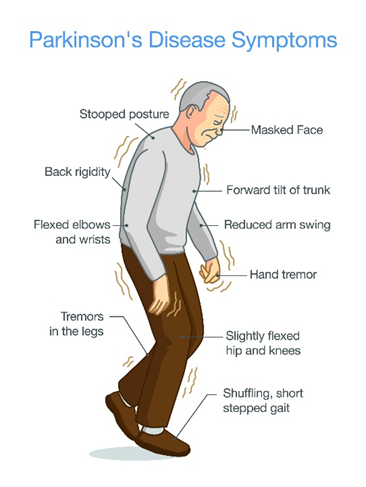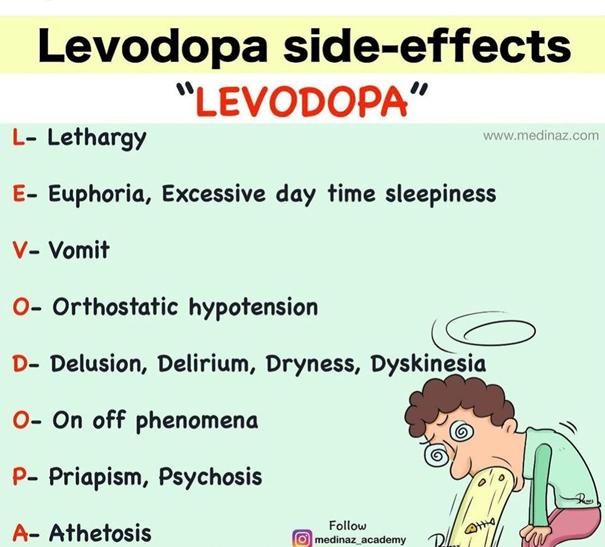Parkinson's disease has which characteristic symptom(s)? SELECT ALL THAT APPLY
Muscle tremors
Slow body movement (bradykinesia)
Rigidity
Pill rolling
Lack of facial expression
Drooling
Correct Answer : A,B,C,D,E,F
A. Muscle tremors:
Muscle tremors, particularly resting tremors, are a hallmark feature of Parkinson's disease. These tremors typically occur in the hands, fingers, arms, legs, jaw, or head and may worsen with stress or inactivity.
B. Slow body movement (bradykinesia):
Bradykinesia refers to slowness of movement and is another key symptom of Parkinson's disease. Patients may have difficulty initiating movement, experience a decrease in spontaneous movement (hypokinesia), and demonstrate reduced range of motion.
C. Rigidity:
Rigidity, or stiffness of the muscles, is a common symptom of Parkinson's disease. It often affects the limbs and trunk and can contribute to difficulty with movement and posture.
D. Pill rolling:
Pill rolling refers to a specific type of tremor characterized by rhythmic, rolling movements of the thumb and fingers, resembling the action of rolling a pill between the fingers and thumb. This tremor is commonly seen in Parkinson's disease.
E. Lack of facial expression:
Parkinson's disease can lead to a reduced range of facial expressions, also known as hypomimia or "masked facies." Patients may have a fixed, expressionless facial appearance and reduced blinking.
F. Drooling:
Drooling, or excessive salivation, can occur in Parkinson's disease due to impaired swallowing function (dysphagia) and reduced control over oral and facial muscles.

Nursing Test Bank
Naxlex Comprehensive Predictor Exams
Related Questions
Correct Answer is A
Explanation
A. Adventitious breath sounds:
Adventitious breath sounds refer to abnormal lung sounds heard upon auscultation of the chest. These sounds include crackles (rales), wheezes, rhonchi, and pleural friction rubs. In the context of fluid volume excess, particularly in the acute phase of a cerebrovascular accident (CVA) or stroke, adventitious breath sounds such as crackles are indicative of pulmonary edema. Pulmonary edema occurs when there is an excessive accumulation of fluid in the lungs, impairing gas exchange and leading to symptoms such as shortness of breath and respiratory distress.
B. Weak pulse:
A weak pulse may suggest poor perfusion or decreased cardiac output rather than fluid volume excess. While decreased cardiac output can be a consequence of heart failure, which may be associated with fluid volume excess, a weak pulse is not a direct indicator of fluid overload. In the acute phase of a CVA, a weak pulse may prompt further assessment for other cardiovascular complications or neurogenic shock.
C. Hypotension:
Hypotension, or low blood pressure, is not typically associated with fluid volume excess. Instead, hypotension may indicate hypovolemia, shock, or other underlying cardiovascular conditions. While hypotension can occur secondary to severe heart failure or fluid overload in some cases, it is not a direct indicator of fluid volume excess in the acute phase of a CVA.
D. Poor skin turgor:
Poor skin turgor is a clinical finding associated with dehydration rather than fluid volume excess. In dehydration, the skin loses its elasticity and becomes less resilient when pinched. In contrast, fluid volume excess is characterized by edema, which may manifest as pitting or non-pitting edema, rather than poor skin turgor. However, in fluid volume excess, the skin may appear stretched or taut due to the accumulation of fluid in the interstitial spaces.
Correct Answer is A
Explanation
A. Orthostatic hypotension:
Orthostatic hypotension, a sudden drop in blood pressure when standing up, is a potential adverse effect of levodopa therapy. This can lead to dizziness and increase the risk of falls, thus supporting the nursing diagnosis Risk for Injury.
B. Nausea and vomiting:
Nausea and vomiting are common side effects of levodopa therapy. While they can cause discomfort and dehydration, they are less directly related to the risk of physical injury compared to orthostatic hypotension.
C. Anorexia and depression:
Anorexia (loss of appetite) and depression can occur as adverse effects of levodopa therapy. While they can affect the patient's overall well-being and quality of life, they are not directly associated with an increased risk of physical injury.
D. Tachycardia and palpitations:
Tachycardia (rapid heart rate) and palpitations are less common adverse effects of levodopa therapy. While they may indicate cardiovascular issues, they are not typically associated with a direct risk of physical injury.

Whether you are a student looking to ace your exams or a practicing nurse seeking to enhance your expertise , our nursing education contents will empower you with the confidence and competence to make a difference in the lives of patients and become a respected leader in the healthcare field.
Visit Naxlex, invest in your future and unlock endless possibilities with our unparalleled nursing education contents today
Report Wrong Answer on the Current Question
Do you disagree with the answer? If yes, what is your expected answer? Explain.
Kindly be descriptive with the issue you are facing.
